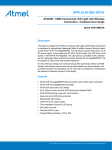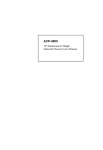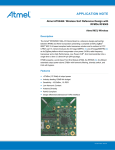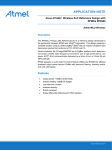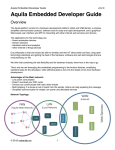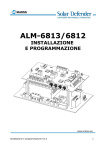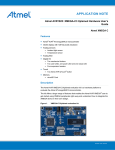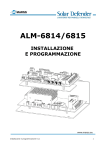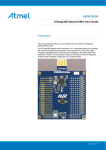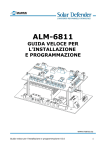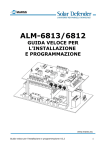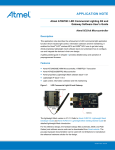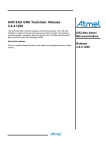Download Real Color ZLL LED Light Bulb with
Transcript
APPLICATION NOTE AT06412: Real Color ZLL LED Light Bulb with ATmega256RFR2 – Hardware User Guide Atmel AVR 8-bit Microcontroller Description The reference design of the Real Color ZLL LED Light Bulb is developed to demonstrate ZLL (ZigBee® Light Link) protocol functions. The reference hardware includes four parts; AC to DC power supply, Atmel single-chip RF MCU, LED drive circuit, and LED String board. The LED string is controlled by application software on Tablet or Smartphone via the ZigBee Light Link protocol commands through the Atmel® ATmega256RFR2. The Real Color ZLL LED Light Bulb supports to color switch, tunable brightness, and so on. For this reference design, the hardware design files (schematic, BOM, and PCB Gerber) and software source code can be downloaded from the Atmel website. The provided hardware documentation can be used with no limitations to manufacture the reference hardware solution for the design. Features • • • • • • • • Atmel AVR® ATmega256RFR2 microcontroller with 2.4GHz radio transceiver Drives three parallel high power LED strings (Red, Green, Blue) Up to 420mA current for each LED string with individual PWM 1kHz PWM input for Dimming Duty Cycle 8W AC to DC power supply Over–Temperature Detection E27 Standard Lamp interface Programming/Debugging interface: JTAG, UART Figure 1. Real Color ZLL LED Light Bulb. 42241A−LED−02/2014 Table of Contents 1. Related Items ....................................................................................... 3 2. Overview .............................................................................................. 4 2.2 Components for Setup ...................................................................................... 5 2.1 Preprogramming Firmware ............................................................................... 5 2.2 Power Supply .................................................................................................... 5 2.3 Programming the Kit ......................................................................................... 5 3. Connectors ........................................................................................... 6 3.1 LED Strings Connector ..................................................................................... 6 3.2 AC Source Connector ....................................................................................... 6 3.3 JTAG/UART Header ......................................................................................... 7 3.4 9VDC Power Header......................................................................................... 7 3.5 3.3VDC Power Header ...................................................................................... 7 4. Peripherals ........................................................................................... 9 4.1 AC to DC Switching Power Supply.................................................................... 9 4.2 LED Driver ...................................................................................................... 10 4.2.1 Diode Selection ................................................................................. 10 4.3 ZigBee Transceiver ......................................................................................... 11 4.4 LED String Board ............................................................................................ 11 4.5 LED Indicator .................................................................................................. 12 4.6 Temperature Sensor ....................................................................................... 12 5. Code Examples .................................................................................. 13 AT06412: Real Color ZLL LED Light Bulb with ATmega256RFR2 – Hardware User Guide [APPLICATION NOTE] 42241A−LED−02/2014 2 1. Related Items The following list contains links to the most relevant documents for the ZLL Bulb with Atmel ATmega256RFR2. • Atmel MCU Wireless Atmega256RFR2/ Atmega128RFR2/ Atmega64RFR2 Summary Datasheet The document contains complete and detailed description of all modules included in the Atmel MCU wireless microcontroller family. • Atmel MCU Wireless Atmega256RFR2/ Atmega128RFR2/ Atmega64RFR2 Datasheet ATmega256RFR2 is the microcontroller used in this solution. • RCB256RFR2 – Hardware User Manual The document describes the usage, design, and layout of the Atmel ATmega256RFR2 radio controller board. • Atmel Studio 6 Atmel Studio 6 is a free Atmel IDE for development of C/C++ and assembler code for Atmel microcontrollers. • Atmel JTAGICE3 JTAGICE3 is a mid-range development tool for Atmel AVR 8- and 32-bit microcontrollers with on-chip debugging for source level symbolic debugging, Nano Trace (if supported by the device) and device programming. AT06412: Real Color ZLL LED Light Bulb with ATmega256RFR2 – Hardware User Guide [APPLICATION NOTE] 42241A−LED−02/2014 3 2. Overview The Atmel AVR Real Color ZLL LED Light Bulb kit is intended to demonstrate the Atmel AVR Atmega256RFR2 single-chip microcontroller and radio transceiver which is used in the Bulb application via ZigBee Light Link protocol. The kit includes three circuit boards: Power Supply Board, MCU Control Board, and LED String Board. Power Supply Board contains the AC to DC switching power supply and the DC to DC circuit. It supplies power for the whole system. The board provides 9.3V and up to 850mA. MCU Control Board contains the MCU ATmega256RFR2, antenna, and the LED driver controller. LED String Board is configured as three parallel LED strings: two Green LEDs, two Red LEDs and one Blue LED. Figure 2-1 shows the available features on the board. Figure 2-1. Overview of Real Color ZLL LED Light Bulb AT06412: Real Color ZLL LED Light Bulb with ATmega256RFR2 – Hardware User Guide [APPLICATION NOTE] 42241A−LED−02/2014 4 2.2 Components for Setup The components listed in Table 2-1 are necessary to perform all functions of the reference design. Table 2-1. 2.1 Components for Kit Setup Component Function Lamp with E27 Reference hardware Kit ZLL Bulb assembled with Power Supply Board, MCU Control Board, and LED String Board Lamp Holder with E27 Supply 110V/220VAC and 50/60Hz frequency Power to the kit Programming Tool with JTAG interface Debug and Programming ZLL/Ethernet Gateway Communicate between the kit and Wi-Fi Router Wi-Fi Router Communicate between the Tablet or Smartphone and ZLL/Ethernet Gateway Tablet or Smartphone based on the Android System Control the kit using application software Application Software Running on the Tablet or Smartphone to control the Kit Preprogramming Firmware The Atmel ATmega256RFR2 on the kit is programmed with the default firmware. The detailed description of the firmware is available in the AT06482 Real Color ZLL LED Light Bulb with ATmega256RFR2 – Software User Guide. 2.2 Power Supply The kit is powered from an AC line in the voltage range 85VAC and 264VA with 50/60Hz frequency. The AC to DC switching power supply can deliver 9.3V and up to 850mA. The 9.3V is converted to proper voltage and supply to LED string. It is also regulated down to 3.3V by an onboard DC-DC regulator, which provides power to the entire main board. 2.3 Programming the Kit The kit can be programmed from an external programming tool through the JTAG interface. AT06412: Real Color ZLL LED Light Bulb with ATmega256RFR2 – Hardware User Guide [APPLICATION NOTE] 42241A−LED−02/2014 5 3. Connectors The Real Color ZLL LED Light Bulb kit has several connectors and headers dedicated for difference purposes. They are shown in Table 3-1. Table 3-1. 3.1 Connector and Functions Connector Function J1 Green LED String connector J2 Blue LED String connector J3 Red LED String connector J4 AC source connector J5 JTAG/UART interface for programming and debug J6,J8 9VDC power header J7,J9 3.3VDC power header LED Strings Connector The J1, J2, J3 are the LED Strings connector. It provides a connection from the MCU Control Board to the LED String Board. The header is polarity sensitive. Table 3-2. Pin on Green LED String Connector Name on the LED Connector 1 G+ 2 G- Table 3-3. Blue LED String Connector J2 Pin on Blue LED String Connector Name on the LED Connector 1 B+ 2 B- Table 3-4. 3.2 Green LED String Connector J1 Red LED String Connector J3 Pin on Blue LED String Connector Name on the LED Connector 1 R+ 2 R- AC Source Connector The AC Source Connector J4 connects to AC line which is a high voltage. Pay attention; DO NOT touch them for your safety when running the kit. Table 3-5. AC Source Connector J4 Pin on AC Source Connector Name on the AC Source Connector 1 L (LIVE WIRE) 2 N (NEUTRAL WIRE) AT06412: Real Color ZLL LED Light Bulb with ATmega256RFR2 – Hardware User Guide [APPLICATION NOTE] 42241A−LED−02/2014 6 3.3 JTAG/UART Header The Atmel AVR ATmega256RFR2 can be programmed and debugged via JTAG header. Any tools which carry the JTAG interface can program and debug the kit. JTAGICE3 is recommended for programming. The definition of the JTAG interface can be found in Table 3-6. Table 3-6. AVR ATmega256RFR2 Programming and Debugging Interface -JTAG Pin on programming header Pin on AVR ATmega256RFR2 JTAG 1 PF4 TCK 2 - GND 3 PF6 TDO 4 - VCC 5 PF5 TMS 6 RSTN nSRST 7 - - 8 - - 9 PF7 TDI 10 - GND The definition of the UART interface can be found in Table 3-7. Table 3-7. AVR ATmega256RFR2 Universal Asynchronous Receiver/Transmitter Interface - UART Pin on programming header Pin on AVR ATmega256RFR2 UART 1 - - 2 - GND 3 - - 4 - VCC 5 - - 6 - - 7 PE0 RXD 8 PE1 TXD 9 - - 10 - - The JTAG and UART interface uses the different pins at the same header. 3.4 9VDC Power Header The connectors J6 and J8 provide a connection of the 9VDC from the Power Supply Board to the MCU Control Board. The header is polarity sensitive. Table 3-8. 3.5 9VDC Power Header Pin on 9VDC power header Name on the 9VDC power header 1 9V+ 2 GND 3.3VDC Power Header The connectors J7 and J9 provide a connection of the 3.3VDC from the Power Supply Board to the MCU Control Board. The header is polarity sensitive. AT06412: Real Color ZLL LED Light Bulb with ATmega256RFR2 – Hardware User Guide [APPLICATION NOTE] 42241A−LED−02/2014 7 Table 3-9. 3.3VDC Power Header Pin on 3.3VDC power header Name on the 3.3VDC power header 1 3.3V+ 2 GND AT06412: Real Color ZLL LED Light Bulb with ATmega256RFR2 – Hardware User Guide [APPLICATION NOTE] 42241A−LED−02/2014 8 4. Peripherals Figure 4-1 shows the Real Color ZLL LED Light Bulb system block diagram. Figure 4-1. Real Color ZLL LED Light Bulb System Block Diagram L 85~264VAC 50/60Hz AC‐DC Power Supply 9VDC N R DC‐DC G B 3.3VDC RF Antenna PWM1# MCU ATmega256 RFR2 PWM2# PWM3# Warning: LED Driver LED Driver LED Driver The kit has high voltages on the board that pose a shock hazard to the user. Appropriate care should be taken when operating the board. In addition to the high power LEDs are used on the LED String board. Do not look directly at the LEDs when the board is active and/or protect your eyes with dark glasses since the LEDs are very bright. To turn on the board, simply plug the power cord into an 85V to 264V and 50/60Hz frequency power source. The LEDs light at application of power. 4.1 AC to DC Switching Power Supply The AC to DC switching power supply, the iw1706, is used to PWM controller. The power supply uses a primaryside control technology to eliminate the opto-isolated feedback and secondary regulation circuits required in traditional designs. The AC to DC power supply works at the fixed-frequency Discontinuous Conduction Mode (DCM) operation at higher output load, and switches to variable frequency operation at light output load for obtaining maximum efficiency. In other words, it uses adaptive multi-mode PWM/PFM control to dynamically change the BJT switching frequency for efficiency and EMI. The AC to DC power supply build-in fault protection features include overvoltage protection (OVP), output short circuit protection (SCP), and over current protection (OCP). The AC to DC power supply provides 9.3V and up to 850mA for system, and input voltage range is 85V to 264VAC with 50/60Hz frequency. AT06412: Real Color ZLL LED Light Bulb with ATmega256RFR2 – Hardware User Guide [APPLICATION NOTE] 42241A−LED−02/2014 9 4.2 LED Driver The PT4115 device is used as LED driver. It is a continuous conduction mode inductive step-down converter, designed for driving single or multiple series connected LED from a voltage source. The device operates from an input power supply between 8V to 30V, and provides an externally adjustable output current of up to 1.2A via set by the sample resistance Rs. The device includes the power switch, and accepts either a DC voltage or a PWM dimming. In this reference design, the PWM dimming method is used. In order to avoid the flicker of the LED, the PWM frequency set to 1kHz in the design. Note: It is better that the voltage difference between the input supply and the LED string more than 2V. Figure 4-2 shows the typical application circuit of the PT4115. Figure 4-2. Typical Application Circuit of the PT4115 Table 4-1. 4.2.1 PWM Dimming of the LED Strings Pin on AVR ATmega256RFR2 Function PE3 Dimming Red String LED PE4 Dimming Blue String LED PE5 Dimming Green String LED Diode Selection For maximum efficiency and performance, the rectifier D should be a fast low capacitance Schottky diode with low reverse leakage at the maximum operating voltage and temperature. It is important to select parts with a peak current rating above the peak coil current and a continuous current rating higher than the maximum output load current. It is very important to consider the reverse leakage of the diode when operating above 85°C. Excess leakage will increase the power dissipation in the device and if close to the load may create a thermal runaway condition. AT06412: Real Color ZLL LED Light Bulb with ATmega256RFR2 – Hardware User Guide [APPLICATION NOTE] 42241A−LED−02/2014 10 4.3 ZigBee Transceiver The Atmel AVR ATmega256RFR2 device integrated a high performance RF-CMOS 2.4GHz radio transceiver. In the design, only four components, ATmega256RFR2, Balun, Capacitance and Antenna, consist of RF function circuit. Figure 4-3. RF Function Circuit In order to obtain high performance about the RF, the PCB layout is very important. How to design the PCB about the RF circuit; refer to the application note Atmel AVR10004: RCB256RFR2 – Hardware User Manual. 4.4 LED String Board Pay attention; DO NOT look at the LEDs directly when they are lit. Otherwise LEDs may potentially harm the user’s eyes. In order to get the perfect feeling of mixed color, two Green LEDs, two Red LEDs and one Blue LED are used in the design, and the LEDs should be well positioned in PCB layout. Figure 4-4. Placement of the LEDs AT06412: Real Color ZLL LED Light Bulb with ATmega256RFR2 – Hardware User Guide [APPLICATION NOTE] 42241A−LED−02/2014 11 4.5 LED Indicator There is a LED available on the board that can be used to indicate the working condition of the kit. The green LED can be activated by driving the connected I/O line to VCC. Table 4-2. 4.6 LED Connections Pin on AVR ATmega256RFR2 LED PE2 Green LED Temperature Sensor The design is equipped with one temperature sensor (100kΩ NTC) connected to the ADC channel of the MCU. The power is supplied by 3.3VDC. The ADC reference is internal 1.6V reference voltage to reduce the error caused by external power. Table 4-3. Temperature Sensor Connection Pin on AVR ATmega256RFR2 Temperature Sensor PF1 NTC AT06412: Real Color ZLL LED Light Bulb with ATmega256RFR2 – Hardware User Guide [APPLICATION NOTE] 42241A−LED−02/2014 12 5. Code Examples The example application is based on the Atmel Software Framework that is included in Atmel Studio 6. The Atmel Software Framework can also be found as a separate package online at: http://www.atmel.com/tools/avrsoftwareframework.aspx. For more information about the code example, see the application note AT06482: Real Color ZLL LED Light Bulb Reference Design with ATmega256RFR2 – Software User’s Guide. AT06412: Real Color ZLL LED Light Bulb with ATmega256RFR2 – Hardware User Guide [APPLICATION NOTE] 42241A−LED−02/2014 13 Revision History Doc. Rev. Date Comments 42241A 02/2014 Initial document revision AT06412: Real Color ZLL LED Light Bulb with ATmega256RFR2 – Hardware User Guide [APPLICATION NOTE] 42241A−LED−02/2014 14 Atmel Corporation Atmel Asia Limited Atmel Munich GmbH Atmel Japan G.K. 1600 Technology Drive Unit 01-5 & 16, 19F Business Campus 16F Shin-Osaki Kangyo Building San Jose, CA 95110 BEA Tower, Millennium City 5 Parkring 4 1-6-4 Osaki USA 418 Kwun Tong Road D-85748 Garching b. Munich Shinagawa-ku, Tokyo 141-0032 Tel: (+1)(408) 441-0311 Kwun Tong, Kowloon GERMANY JAPAN Fax: (+1)(408) 487-2600 HONG KONG Tel: (+49) 89-31970-0 Tel: (+81)(3) 6417-0300 www.atmel.com Tel: (+852) 2245-6100 Fax: (+49) 89-3194621 Fax: (+81)(3) 6417-0370 Fax: (+852) 2722-1369 © 2014 Atmel Corporation. All rights reserved. / Rev.: 42241A−LED−02/2014 Atmel®, Atmel logo and combinations thereof, Enabling Unlimited Possibilities®, AVR®, and others are registered trademarks or trademarks of Atmel Corporation or its subsidiaries. Other terms and product names may be trademarks of others. Disclaimer: The information in this document is provided in connection with Atmel products. No license, express or implied, by estoppel or otherwise, to any intellectual property right is granted by this document or in connection with the sale of Atmel products. EXCEPT AS SET FORTH IN THE ATMEL TERMS AND CONDITIONS OF SALES LOCATED ON THE ATMEL WEBSITE, ATMEL ASSUMES NO LIABILITY WHATSOEVER AND DISCLAIMS ANY EXPRESS, IMPLIED OR STATUTORY WARRANTY RELATING TO ITS PRODUCTS INCLUDING, BUT NOT LIMITED TO, THE IMPLIED WARRANTY OF MERCHANTABILITY, FITNESS FOR A PARTICULAR PURPOSE, OR NON-INFRINGEMENT. IN NO EVENT SHALL ATMEL BE LIABLE FOR ANY DIRECT, INDIRECT, CONSEQUENTIAL, PUNITIVE, SPECIAL OR INCIDENTAL DAMAGES (INCLUDING, WITHOUT LIMITATION, DAMAGES FOR LOSS AND PROFITS, BUSINESS INTERRUPTION, OR LOSS OF INFORMATION) ARISING OUT OF THE USE OR INABILITY TO USE THIS DOCUMENT, EVEN IF ATMEL HAS BEEN ADVISED OF THE POSSIBILITY OF SUCH DAMAGES. Atmel makes no representations or warranties with respect to the accuracy or completeness of the contents of this document and reserves the right to make changes to specifications and products descriptions at any time without notice. Atmel does not make any commitment to update the information contained herein. Unless specifically provided otherwise, Atmel products are not suitable for, and shall not be used in, automotive applications. Atmel products are not intended, authorized, or warranted for use as components in applications intended to support or sustain life.















